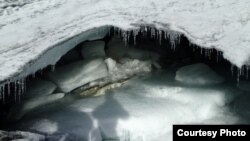Scientists recently completed a unique expedition into the glaciers of western Uganda’s Rwenzori Mountains. The trip aimed to raise awareness of Africa’s vanishing glaciers as part of a global water crisis.
Scientists from several environmental and water conservation NGO’s, and the Makerere University Mountain Research Centre in Uganda, completed the two week trip. It allowed them the opportunity to examine the glaciers first hand and compare the extent of recession from prior measurements.
Adventurer and author Luc Hardy is founder of Pax Arctica, an organization that promotes awareness of the impact of climate change on artic regions. He led the expedition of scientists.
He reflected that the exploration was a success overall. He described the weather as being good with lots of sunshine, which allowed the team to gather the vital information needed to determine the extent and rate of the recession of Uganda’ glaciers.
“Obviously in an expedition like this you cannot just come back and say ‘ha-ha’, I’ve found that the world has changed. It really needs to be put in perspective with prior expeditions and data collections, explained Hardy, who went on to describe that they observed some obvious signs of receding of the glaciers where they were located.
The explorer explained that the ladders that had been installed on the glaciers a few years ago so scientists could climb down under the glaciers to examine them, showed signs the glaciers had significantly receded. By just looking at the ladders, Hardy said they were able to see worsening signs of recession of the glaciers because the ladders were just going down into a void, where there was once ice.
“What appears is normal melting because of the drier season, but interestingly enough, you can see it kind of worsened because you can see how the glacier is sandwiched between warming at the top and warming at the bottom,” he said.
The scientists conducted GPS measurements, took photographs and videos of the glaciers to analyze the information over the next few weeks and then put the data into proper context.
On a personal note, Hardy exclaimed how he and the other explorers were pleasantly surprised to see people in the Ugandan community surrounding the glaciers, already focusing on ways to conserve water, and prepare for the future when water in the area could potentially become scarce or non-existent.
Scientists from several environmental and water conservation NGO’s, and the Makerere University Mountain Research Centre in Uganda, completed the two week trip. It allowed them the opportunity to examine the glaciers first hand and compare the extent of recession from prior measurements.
Adventurer and author Luc Hardy is founder of Pax Arctica, an organization that promotes awareness of the impact of climate change on artic regions. He led the expedition of scientists.
He reflected that the exploration was a success overall. He described the weather as being good with lots of sunshine, which allowed the team to gather the vital information needed to determine the extent and rate of the recession of Uganda’ glaciers.
“Obviously in an expedition like this you cannot just come back and say ‘ha-ha’, I’ve found that the world has changed. It really needs to be put in perspective with prior expeditions and data collections, explained Hardy, who went on to describe that they observed some obvious signs of receding of the glaciers where they were located.
The explorer explained that the ladders that had been installed on the glaciers a few years ago so scientists could climb down under the glaciers to examine them, showed signs the glaciers had significantly receded. By just looking at the ladders, Hardy said they were able to see worsening signs of recession of the glaciers because the ladders were just going down into a void, where there was once ice.
“What appears is normal melting because of the drier season, but interestingly enough, you can see it kind of worsened because you can see how the glacier is sandwiched between warming at the top and warming at the bottom,” he said.
The scientists conducted GPS measurements, took photographs and videos of the glaciers to analyze the information over the next few weeks and then put the data into proper context.
On a personal note, Hardy exclaimed how he and the other explorers were pleasantly surprised to see people in the Ugandan community surrounding the glaciers, already focusing on ways to conserve water, and prepare for the future when water in the area could potentially become scarce or non-existent.










